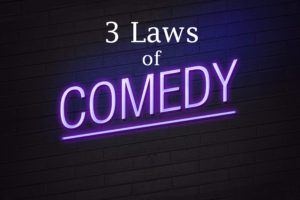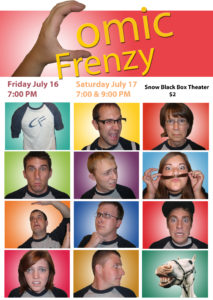
Comedy plays a huge role in our lives. I mean, think about it…there are massively popular late-night TV shows based around making fun of current world events and situations. What’s so funny about the president of the United States (besides his orange completion and Pidgeotto hairstyle)? Why do we get a good laugh over Mr. Kim of North Korea when he’s launching missiles and threatening the USA? From a certain point of view, these things really aren’t funny. But, from a different standpoint, they’re gut-busting hilarious!

As a former improv comedy actor and eternal student of hilarity (such is my life), I find comedy is a great way to relieve the tension not just in life, but in my writing. In our world today, there’s a lot of tension that we need relief from, so comedians use those events to make us laugh and feel better that North Korea wants us dead and Russia is, well, Russia. We laugh so we don’t cry. What a dreary life this would be if we had nothing to laugh about!
As a human being, laughing is important. As a human being who also happens to be a writer, knowing how to make people laugh is just as important, if not more so. Nothing’s worse that saying something “funny” and having the audience grow stone-cold quiet followed by a delayed…”What?” from an audience member. (Yeah. That happened to me once. #Awkward)
For some people, comedy comes without much thought. Somehow, they just know what gets a laugh. For others, it’s a learned thing. And yes, comedy can be taught (although, to be frank, some people are more receptive to such teachings than others). While there is a lot that goes in to making people laugh, let me share with you three tried and true laws of comedy that can turn practically anything into comic gold.
- Three is Funny
The number “3” isn’t necessarily funny by itself, but coupled with a good (or bad) quote or happenstance, it can be the difference between a laugh and a rotten tomato. You see, things are funnier in threes. There is a lot more comic weight the third time a joke is said or the third time someone slips on a banana peel.
Consider my previous example of me saying something during an improv show only to be rewarded with deafening silence. I mean, the other actor I was playing with looked at me like I had just spoken ancient Greek, and the audience member near the back echoed his concerns by asking a simple, “What?”
Wow that was awkward.
Fortunately, that scene set the stage for the two other scenes following it. This is how it went down:
Three of us did a scene while three others of our troupe waited outside the room. After we completed the scene, we repeated it, only this time our words were complete and utter nonsense-gibberish, if you will. The three that had been out of the room watched the scene unfold and then had to do their best to recreate it, trying to get it as close to the original as possible.
Well, when we did the scene in gibberish, we came to the part with the awkward silence. Having arrived there using non-coherent words and sentences, it got a few chuckles from the audience. When the next three actors reenacted the scene in their own way, they came to the pause, had no idea why it was there, and the crowd erupted in laughter. In other words, my goof during the first scene was one of the high points of the third.
In writing, the rule of three is true in most cases and, generally, the second instance might not get much of a laugh. But, if you can bring something up from earlier in your book a second time, then again a third time when the reader has forgotten about it again, you’re more likely to get a laugh.
But it’s not always enough to just repeat something three times. On the third time, your audience will expect what’s coming. The comedy occurs when that third instance is different. If they’re expecting one thing and get another, you’re more likely to get a laugh. When in doubt, you can always ask your beta readers what they found funny in your book once they’re through with it. If you can set it up right, it’s bound to be a winner.
2. Truth in Comedy

One of the reasons jokes (and humor in general) are funny is because they poke fun at our everyday, mundane tasks and experiences. Think of your favorite comedian. Why do you laugh so hard at his or her jokes? Chances are they’re making fun of something we are all familiar with.
Take Brian Regan. The things he jokes about are relatable to the vast majority of Americans. For example, his sketch about calling dibs on a particular seat in the car. Since he never got the seat he wanted as a child anyway, he made sure his siblings thought he wanted the BACK, MIDDLE, WITH MY FEET ON THE HUMP! And when he goes overboard about claiming the most loathsome seat in any vehicle, we laugh. And we laugh because we’ve all been there, whether as kids or college students packing into a cramped car together.
When writing, truth can be used to get a smile, a chuckle, or a full-on belly laugh. Find the mundane and exploit it. Most things are ridiculous if you think about it too much, and pointing out the ridiculous is where that bit of comedy stems.
But perhaps you’re writing science fiction or fantasy, where real-life things for you simply don’t exist. Or, perhaps more likely, the mundane things of your story don’t exist in our real world. Those can still be used to find humor. If your reader is invested in your characters and your world, then whatever mundane and everyday tasks and events they go through becomes believable and real. Find the things in your story that can be made fun of.
For example, we’ve all been stuck in traffic and wanted to lay on the horn so those around you will know how incredibly upset you are. And then a motorcycle speeds past you between the two lanes, and you think, “I hate him so much right now.” Well, in your book, you don’t have cars or motorcycles, and therefore you don’t have horns. But you do have horse and carriage, handcarts, and peasants on foot. To your characters, these are mundane modes of transportation, and when the peasants start passing between the royal carriage and its escorts during a medieval traffic jam, your most proper Duke of the Dominion yells and curses at them before realizing it’s not doing anything except making him look more foolish. And then the dragon rider flies by overhead and lands in the city, which is the last straw before Duke of Dominion starts making crazy demands of his courtiers. (That was a pretty bad example, I’ll admit, but here’s a bonus lesson: good humor can take time to conjure up.)
3. Don’t Go Cheap

One of the biggest problems I see in comedians and comedy in general these days is the constant need for a cheap laugh. Vulgar, dirty, obscene, and suggestive jokes might trigger a laugh, sure, but it’s nowhere near as fulfilling as one well thought out and crafted for that particular purpose. The quick and easy laugh – the vulgar and the obscene – are the low hanging fruit; anyone can grab those, which makes them nothing special. But the fruit way up on the tallest bough? That’s where the sweetest jokes are waiting to be picked.
If you want a quick and easy laugh, then by all means go for the low hanging fruit (spoilers: I and countless others don’t want to hear those jokes anyway, so you might as well avoid them to begin with). But if you want a good, memorable laugh that people will be talking about for generations, make it unique and intelligent. Intelligent jokes make the audience/reader feel smart for getting it, which makes it that much better.
My improv troupe was directed to stay away from crass jokes of any kind, which included bathroom humor and sexual innuendos. By steering clear of those jokes, we had to reach higher, and I can assure you that our audience didn’t miss the low-hanging fruit. But when it came to audience enjoyment, there are few other places I’ve heard such roars of laughter from any comedy show. Not to toot my own horn, but we were a place for people to laugh from the depths of their souls. And sell-out audiences for each performance has to be something of a decent indicator that our comedy was, in fact, hilarious. (Brb, patting myself on the back.)
Conclusion

People love to laugh. Science says it’s good for us, and who can deny the good feelings they get after a good snort followed by a wheeze of silent laughter that is a key component to gaining a 6-pack? These three rules of comedy will help you on your way to fame, fortune, and everything that goes with it (to quote Queen). Of course, there are more rules than these (which is why the title of this post doesn’t include the word “The” at the beginning), but this should at least get you started in creating witty scenes in your writing.
Have a question about writing comedy? Ask me know in the comments! Or, let me know some other comedic rules you follow for the best laughs.

